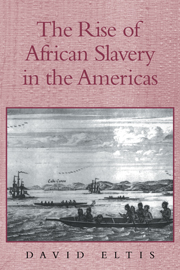Book contents
- Frontmatter
- Contents
- List of Tables
- List of Maps
- Preface
- Abbreviations
- Chapter 1 Slavery and Freedom in the Early Modern World
- Chapter 2 The English, the Dutch, and Transoceanic Migration
- Chapter 3 Europeans and African Slavery in the Americas
- Chapter 4 Gender and Slavery in the Early Modern Atlantic World
- Chapter 5 Productivity in the Slave Trade
- Chapter 6 Africa and Europe in the Early Modern Era
- Chapter 7 The African Impact on the Transatlantic Slave Trade
- Chapter 8 The English Plantation Americas in Comparative Perspective
- Chapter 9 Ethnicity in the Early Modern Atlantic World
- Chapter 10 Europe and the Atlantic Slave Systems
- Epilogue on Abolition
- Appendices
- A The Age and Sex of Africans in the Transatlantic Slave Trade, 1663–1713
- B Slave-Price Appendix
- C Merchandise Imported to West Africa, 1662–1713
- D Valuations of Produce Exports from the Leeward Islands in 1700
- Maps
- Sources and Bibliography
- Index
D - Valuations of Produce Exports from the Leeward Islands in 1700
Published online by Cambridge University Press: 05 August 2012
- Frontmatter
- Contents
- List of Tables
- List of Maps
- Preface
- Abbreviations
- Chapter 1 Slavery and Freedom in the Early Modern World
- Chapter 2 The English, the Dutch, and Transoceanic Migration
- Chapter 3 Europeans and African Slavery in the Americas
- Chapter 4 Gender and Slavery in the Early Modern Atlantic World
- Chapter 5 Productivity in the Slave Trade
- Chapter 6 Africa and Europe in the Early Modern Era
- Chapter 7 The African Impact on the Transatlantic Slave Trade
- Chapter 8 The English Plantation Americas in Comparative Perspective
- Chapter 9 Ethnicity in the Early Modern Atlantic World
- Chapter 10 Europe and the Atlantic Slave Systems
- Epilogue on Abolition
- Appendices
- A The Age and Sex of Africans in the Transatlantic Slave Trade, 1663–1713
- B Slave-Price Appendix
- C Merchandise Imported to West Africa, 1662–1713
- D Valuations of Produce Exports from the Leeward Islands in 1700
- Maps
- Sources and Bibliography
- Index
Summary
Valuations of exports from Barbados and Jamaica for selected years, 1664–1701, are presented elsewhere. Data, and indeed records generally, are less abundant for the English Leeward Islands. There are few counterparts in the Leewards to the naval officer's reports that allow us to derive valuations of produce in the major English islands. Summaries of reports for the Leewards have survived from which John McCusker derived estimates of sugar exports and production for individual islands, but these do not lend themselves to estimates of values of overall trade.
Limitations on data availability restrict the estimates to the year 1700. McCusker's figures for sugar volumes are accepted here as the starting point, and valuations of sugar are derived by multiplying these volumes by the price for 1700 extracted from McCusker's time series on sugar prices. The question is, what was the volume and price of sugar by-products that were exported, as well as their non-sugar counterparts? The answers offered here come from two sources. The first are the fragmentary returns of produce entered for export that have survived for what were the three major Leewards at this period, Antigua, Nevis, and Montserrat. For Antigua there are detailed reports for May 27 to September 1704, December 25, 1705 to June 26, 1706, September 25, 1707 to March 25, 1708, and June 25 to September 25, 1708. For Nevis, the extant naval officer's returns are for August 29, 1683 to August 25, 1684, November 4, 1685 to August 8, 1687, and January 12, 1704 to December 25, 1705.
- Type
- Chapter
- Information
- The Rise of African Slavery in the Americas , pp. 303 - 306Publisher: Cambridge University PressPrint publication year: 1999



